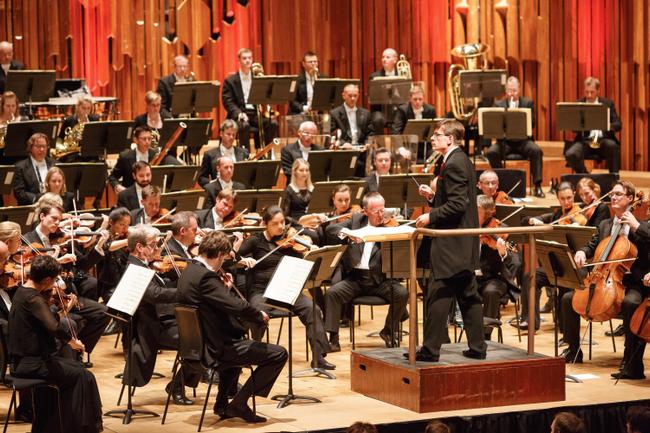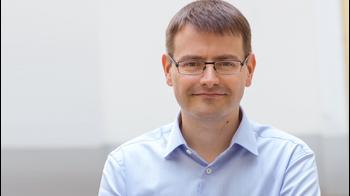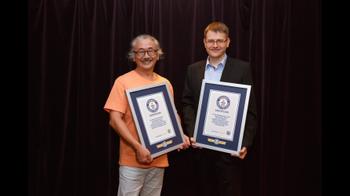
Dreams Come True: Behind the Scenes of Final Symphony II
As a self-professed Final Fantasy IX fan, the day I get to see the London Symphony Orchestra prepare and rehearse their new sweeping Final Fantasy IX Piano Concerto is a rather special one. There's a scant number of people up in the spectator seating at the LSO's dedicated rehearsal space - and sitting a short distance away from me, watching intently, is Nobuo Uematsu. It's a strange, awesome scene.
'Should a fan even be here?' I wonder - but I'm lucky in that many present - right to the very top - are just as big a fan as I.
"Well, I'm a Final Fantasy fanboy," Thomas Böcker, the mastermind behind the Final Symphony concert series, admits with a laugh when we first meet.

"I'm also very much a big fan of Uematsu, so... it's my passion," he adds. Böcker appears in high spirits after witnessing the energetic rehearsal of Final Fantasy music from the iconic London Symphony Orchestra, who are perhaps best known for being the outfit behind several iconic John Williams movie score recordings, including Star Wars and Indiana Jones. Indeed, that heritage is part of why Böcker chose them for Uematsu's works.
"It's my dream orchestra," he gushes, no less excited about working with them for the third time after collaborating on the final Final Symphony, featuring music from FFs 6, 7 and 10, and Symphonic Legends, a Zelda concert.
"I've been a fan of this orchestra since I was a child, basically. I grew up with Star Wars and Indiana Jones - I've always been a big fan of John Williams; that's the sound that's in my mind, and in my heart - so to be here with the London Symphony Orchestra is really like a dream coming true. It's a real highlight of my career, to be honest."
Böcker has become a name synonymous with game score concerts - and he clearly is passionate about it.Böcker's career is one now inexorably entwined with the world of video game music. Growing up more a computer man than a console man, it'd take the young would-be concert Producer's brother to convert him.
"I was actually more into the computer music side, and he was more into the videogame music side," he admits, "But at one point I listened... and it sounded very cool. I was like, wow, what is that?! It was Final Fantasy. So... this is how I switched - well, I didn't switch, but it was Mr. Uematsu's music that immediately caught my attention, and then I started to work more with the music from Final Fantasy."
Böcker would go on to produce the first video game music concert outside Japan as early as 2003 - essentially spearheading a movement that would quickly give birth to a wide range of concert series', from the kid-friendly casual spectacle of Video Games Live to more serious endeavors from a variety of production companies. Böcker himself would go on to win multiple awards and, this year, receive a Guinness World Record alongside Uematsu.
The impact overhearing a bit of Uematsu music on his brothers' console has had is profound, then - and this is something that Böcker says ultimately proves why he believes the man's iconic work on Final Fantasy is the best candidate for spreading video game music to the masses.
"The good thing with Uematsu-san's work is just... well, first, it's Final Fantasy," he says with a smile and a shrug.
"Final Fantasy has these wonderful epic stories that are full of colors, with melodies for love scenes, battle scenes - and all these things are a nice pool to work with for our arrangers.
"They can choose from all of these fantastic melodies - Mr. Uematsu is a real melody maker, which is absolutely fantastic. Our arrangers can then work with these fantastic melodies and actually retell the stories of these games within the concerts. That, I think, is very special."
"I think to have a composer like Mr. Uematsu, who has this skill of writing memorable melodies, then on the other hand to have a franchise like Final Fantasy which offers all these stories we can use... I don't want to say there isn't any other game that could possibly work like that, but..." He pauses for thought.
"I want to work with what I love the most, and it's really Final Fantasy music, it's Mr. Uematsu, who has supported me so much over the years - we've known each other for 12 years, and he has supported me all the time. So I'm really, really grateful to him - and I want to see his music more featured all over the world with this quality level."
While the immediate goal for concert series' like Final Symphony is to expose the music of Final Fantasy and Uematsu, Böcker also believes there's more at stake. As a lover from the orchestra from an early age, he recognizes the danger in a young generation not paying as much attention to non-electronic music - and in an interesting twist of fate, the often electronic music of video games could well play a part in expanding the orchestral audience again.
"For me, this is now simply symphonic music for a new, young generation," he argues. "As a producer I don't only see it for commercial reasons - for me it's also about music education."
"I don't say that we convert all people who are coming our concerts to Beethoven fans or Mahler fans... but I think, as an orchestra manager, this is what I can tell them: this is their very best chance. The best chance they've had in many, many years.
"Here we have young people, 18 to 34 years old. They are coming to our concerts, they are coming /back/ to our concerts. In our concerts there are no screens - there's just the music. The heroes are the musicians on-stage. We build a connection between the orchestra and the fans - so that's a big chance for everybody. Orchestra managers should really use it."
That opportunity is one sometimes ignored or even furiously rejected by members of the traditional classical community, with events such as these concerts or video game scores posting entries to the UK Classic FM Hall of Fame rustling feathers. In the face of what video game music can offer, Böcker pulls no punches in his response to such attitudes.
"That's always going to be a problem," he laments. "There will always be ignorant people who say it doesn't belong, it isn't good enough - blah, blah. The thing is, they don't really listen to the music. That's the problem. I think - I can only speak for my own productions, but if you listen to Final Symphony and Final Symphony II, you will realize that these are symphonic works with a high quality."
"Of course these pieces can have their place in regular concerts, and that's actually also my long-term goal... that one day one orchestra will say 'Of course, let's try it - we will perform a regular concert where we will have the likes of Strauss, Tchaikovsky, you name it... and then, some Uematsu.'
"Unfortunately, for many people, games still have a bad reputation. But if you don't tell the audience that it's from a game and just say 'This is a Japanese contemporary composer's work for a piano concerto' and then we perform, for instance, our Final Fantasy IX piano concerto, I'm sure that a lot of people would like it. A lot."
If the performance the following day manages to convert any doubters is unclear, but what is clear is that a lot of people do like it a lot, as predicted.
After a soaring performance with multiple standing ovations, it's abundantly clear that in some manner or another that the marriage between games and the orchestra is here to stay. The receipt of a couple of Guinness World Records are nothing to sniff at, but are also just another brick in the longer, more arduous road to wider mainstream acceptance.
A self-professed fanboy, it's obvious how to close out an interview with Böcker. As he beams with delight at the quality of the rehearsal - something that will only be bettered the following evening for the actual performance - I hit him with the really hard question for any fanboy to answer. He laughs and shakes his head, shrugs his shoulders in response.
"If you ask me which my favorite is, this changes all the time - it depends a little bit on my mood," he muses. "At the moment it would be FF7 - I like its dark, deep story theme... but today, when we rehearsed the FF9 music, I was just like 'wow'. It's more like... a fairytale style, it's the total opposite of Final Fantasy VII, but it works so well when it comes to the music."
"That's the good thing about Mr. Uematsu - he has so many different types of music, so many different colors - it's very hard to describe on one... but for the moment, if you really ask me, it's 7."

